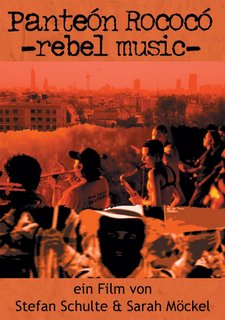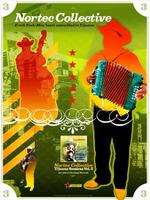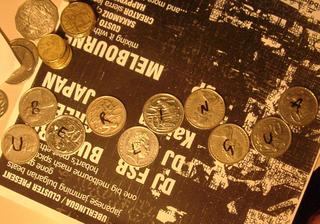Documentary :: Panteón Rococó Rebel Music
 El documental Panteón Rococó rebel music retrata el grupo famoso Panteón Rococó y da un imagen de la situación política en su país México. Las entrevistas tratan de la historia del grupo, la sociedád mexicana y los derechos de los indígenas. Hay también grabaciones de conciertos en vivo. Miembros de Panteón Rococó, de Indymedia Chiapas y de la Organización Derechos Humanos Chiapas toman parte y entre otro contan la historia del Neozapatismo. La banda se ocupo con la realidad mexicana y la lucha de los Zapatistas en sus canciones y apoyan este movimiento en sus grandes conciertos en México y Europa.
El documental Panteón Rococó rebel music retrata el grupo famoso Panteón Rococó y da un imagen de la situación política en su país México. Las entrevistas tratan de la historia del grupo, la sociedád mexicana y los derechos de los indígenas. Hay también grabaciones de conciertos en vivo. Miembros de Panteón Rococó, de Indymedia Chiapas y de la Organización Derechos Humanos Chiapas toman parte y entre otro contan la historia del Neozapatismo. La banda se ocupo con la realidad mexicana y la lucha de los Zapatistas en sus canciones y apoyan este movimiento en sus grandes conciertos en México y Europa.Este documental de Sarah Moeckel y Stefan Schulte estuvo realizado en México 2002. Duración : 52 min. / Lenguas : Español-Inglés / Subtitulos : Español / Formato : NTSCDVD 150 Pesos + 20 Pesos para enviarInformaciones y encarga el DVD por eMail: info@rebelfilms.de
Dieser Film portraitiert die mexikanischen Ska-Punk-Helden Panteón Rococó und beleuchtet außerdem die politischen Verhältnisse ihrer Heimat. Der Film soll zu einem besseren Verständnis des politischen Kontextes der über die Grenzen Mexikos hinaus sehr bekannten Band beitragen. In zahlreichen Interviews wird neben der Bandgeschichte auf die sozialen Probleme der Gesellschaft Mexikos und auf den Kampf für die Rechte der indigenen Bevölkerung eingegangen. Zu Wort kommen unter anderem Mitarbeiter von Indymedia Chiapas, ein Bandmitglied, das sich für ein autonomes Kulturzentrum einsetzt und ein Vertreter der Menschenrechtsorganisation Chiapas. Zudem werden die Ziele der Zapatistas beleuchtet und ein kurzer Überblick über die Geschehnisse in der Bewegung seit 1994 gegeben. Die Zuschauer bekommen einen tieferen Einblick hinter die Kulissen der Band und zugleich in die mexikanische Realität, mit der sich Panteón Rococó in ihren Songtexten auseinandersetzen.
Diese Musik-Dokumentation wurde von Sarah Moeckel und Stefan Schulte bei einem zweimonatigen Aufenthalt in Mexiko 2002 gedreht. DVD, 52 min., spanisch/englisch mit deutschen Untertiteln für 13,- € zzgl. 1,44 VersandWeitere Informationen und Bestellungen per eMail an info@rebelfilms.de




